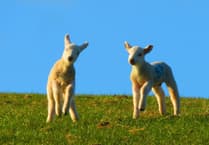As winter approaches the threat levels from avian influenza (or bird flu) starts to rise, mostly because of the increase in migratory bird activity.
Because of a rise in cases, on November 5 the chief veterinary officers in England, Wales and Scotland declared an Avian Influenza Prevention Zone (AIPZ) in their respective countries.
This means that all bird keepers (whether they have pet birds, commercial flocks or a few birds in a back garden) are required by law to take a range of biosecurity measures.
Bird flu can have harmful effects on humans, usually linked to the respiratory tract, and it is often fatal in birds.
Although the Isle of Man is not an AIPZ as yet it is close to an affected area (namely Fylde in Lancashire) and so it would be wise for all Manx bird keepers to follow the same biosecurity measures as their UK counterparts.
These measures include:
l ensuring the areas where birds are kept are unattractive to wild birds, for example by netting ponds, and by removing wild bird food sources.
l feeding and watering captive birds in enclosed areas, or under cover, to discourage wild birds.
l minimising movement of people and pets in and out of bird enclosures.
l regularly cleaning and tidying areas where birds live.
l disinfecting footwear when leaving the bird enclosures (or, better still, keep separate footwear in the bird enclosure), and washing hands thoroughly
l keeping other pet birds, such as ducks and geese, completely separate from hens (because the former often do not show signs of bird flu but can easily pass on the virus).
Bird flu isn’t an airborne disease, and it spreads from bird to bird by direct contact or through contaminated body fluids and faeces. It can also be spread via contaminated feed and water or by dirty vehicles, clothing and footwear.
The avian influenza virus changes frequently, creating new strains, and there is a constant risk that one of the new strains may spread easily among people.
But there is no evidence that any recent strain has been able to spread directly between people.
Very importantly, we should not be deterred from feeding wild birds, particularly at this time of year when they need our help the most. Keeping bird feeders, tables and water bowls clean, and washing your hands thoroughly after you’ve touched them, will help to keep the virus at bay.
If you have an injured or sick bird, wild or captive, please do not take it into a veterinary surgery’s waiting room - keep it outside in a container so that a vet can examine it in the car park. This will minimise the risk of contamination.
Bird flu aside, we have an ongoing bird problem on the Isle of Man in the shape of cockerels.
They are routinely dumped in our countryside by breeders who allow eggs to hatch and can’t deal with the resultant 50% likelihood that a cute chick will become a cockerel.
It is well worth noting that dumping cockerels is an offence under the ’abandonment’ section of the Cruelty to Animals Act 1997. But there is a limit to how many unwanted cockerels we can take here at Ard Jerkyll - they are virtually impossible to rehome and they fight with each other (sometimes to the death) if we keep too many on our premises.
We are always looking for suitable new homes for our cockerels, many of whom are tame and friendly towards humans - but they are noisy, at all hours of the day or night, and so they can’t live in urban areas.
Foghorn (need we say more about noise) is a youngster who wants nothing more than to potter about, pecking away at shrubs and bushes in search of insects to eat.
He’s great fun to have around Ard Jerkyll, but he needs to find his ’forever home’ so that we can free up space for more birds.




